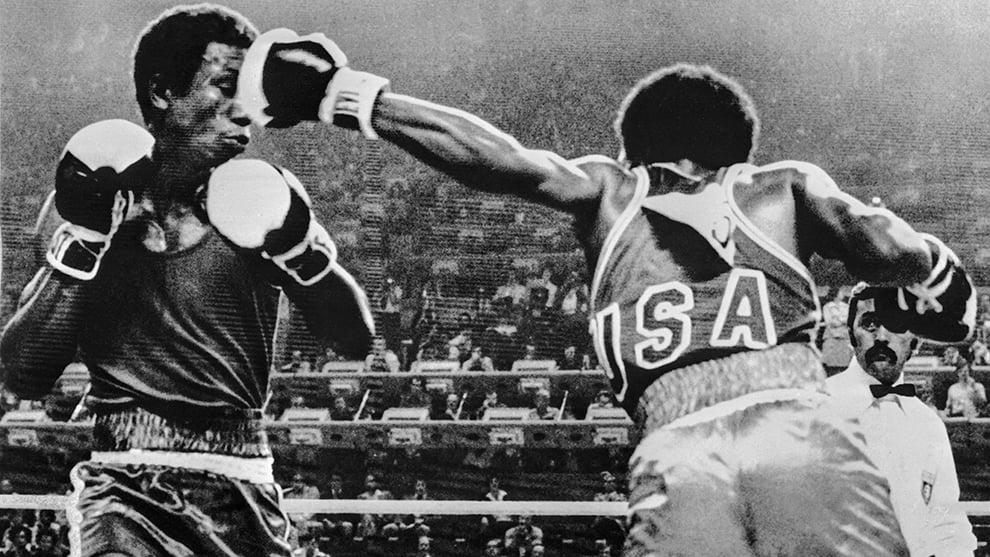By Steve Bunce
MONTREAL, the battle for boxing power. It was the East against the West in the ring, a Cold War battlefield, the good guys against the bad guys at the Olympic boxing in Montreal in the summer of 1976.
The Olympics in 1980 in Moscow and Los Angeles in 1984 were decimated by the global shifting of warring nations, and the politics led to boycotts; the boycotts ruined the action. The USA missed Moscow, the Soviets and Cubans, and their allies, missed Los Angeles. In some ways, Montreal was the purest of all Olympic boxing events.
In Moscow, the Eastern Bloc took total control; the Cubans won 10 medals, the Soviets seven without the USA. There was payback four years later in Los Angeles when the USA won nine of the 12 golds and medals in 11 of the 12 weight classes. However, the real boxing tale took place in Montreal, and it is one of the most inspiring Olympic events. Underdogs, bad guys, ring kings, twists and savagery in the ring. And it was a bare, three-roped ring where legends were made.
In 1976, the Olympic boxing was at its greatest and most memorable. It was the stuff of boxing dreams, iconic fighters, heroes, villains and there were cameos by the best of just about any generation.
In 1972, the Cubans had won their first gold medal in the Olympic boxing ring, the USA managed just one gold in Munich. The Cuban force had taken three golds, a silver and a bronze – they were suddenly the world’s most dominant boxing nation, feared by all, even their allies in Eastern Europe. The Soviet satellite in the Caribbean was suddenly in control of the amateur sport.
The World championships had launched in Havana in 1974 and once again the Cubans were dominant. The battle in the boxing ring was between the Cubans and the Soviets, bonded by their communism, but bitter rivals anywhere near a ring.
The Americans had their usual problems to deal with in the months, weeks and days before the first bell in Montreal. It was a fresh team, a new team, a raw team; the Cubans were seasoned hardened and hungry. The Americans did have Howard Davis, their only gold winner from Havana. The North Koreans, East Germans, Polish and Romanians were just dangerous extras in the show. The USA had no allies going into the Olympic boxing tournament in Montreal; the Eastern Bloc ran the show, there would be no favours from officials: It was the Cold War in the ring. The USA needed magic.
In Havana, two summers earlier, the USA had managed just one gold medal; the Cubans had won five gold, a silver and two bronzes at the inaugural World championships. There was a bad feeling going into Montreal – there could have been a massacre.
In the end, the USA won five golds and Cuba three. They met in three finals and the USA won all three. At flyweight, Leo Randolph, the forgotten man of Montreal, beat Ramon Duvalon. Then Howard Davis won gold at lightweight, and he was classy.
And then it was light-welterweight, and the boxing at the Montreal Olympic games moved to a new level.
Andreas Aldama was a freak at the weight. He was over six foot, and when he hit people, they fell over. In Montreal, he stopped or knocked all four of his opponents and he did it in style. In the opposite corner for the final, the American idol, Ray Leonard was expected to be the next. What a fight, Leonard had to dig deep, trade, fight and survive. It was incredible and, at the end, Leonard won 5-0; Sugar Ray simply refused to lose. The Cubans were shaken and then, at light-heavyweight, they played their joker, the beast, the knockout machine, Sixto Soria.
Soria had stopped or knocked out all three of his opponents in Montreal, leaving two finished in the second round and one in the first. He glared over at his American opponent in the final and that was possibly a mistake. In the opposite corner was former Marine, future world heavyweight champion and full-time boxing lunatic, Leon Spinks. Never glare at Leon – it was a simple rule.
What a fight it was. Soria in red, wearing those tiny gloves with the white patch across the knuckles and Spinks in white. They met at the bell and Spinks forced Soria back and they just fought each other to a standstill from that early point. It was one of the finest Olympic finals ever.
In the third, they exchanged left hooks, Spinks landed a right and Soria backed off hurt and then Spinks chased after him, sensing the end. Then, Leon Spinks lands one final right cross and down goes Soria. The Cuban was on the canvas, sprawled, face first and he somehow got up to beat the count. He is unsteady, falls into the ropes and is then stopped on his feet. It is over, it is an American gold.
I was not all gloom for Cuba. Teofilo Stevenson won his second gold and Cuba’s third when he did the usual and stopped his opponent in the heavyweight final. Stevenson knocked out all four of his opponents in Montreal, including future world heavyweight champion, John Tate, in just 96 seconds of the first round. What a tournament it was.
Paris was, obviously, different in scale, but all seven golds for men went to the old Eastern Bloc. The USA needs to find a new Spinks, Davis and Leonard before the first bell in Los Angeles. Trust me, the search is on for the heart, soul and punch of a new Spinks.
